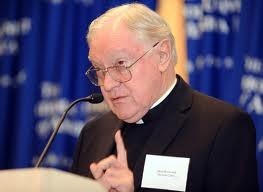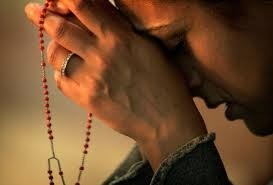Reading between the lines of a bishop’s “apology”

Yesterday, one of the country’s most prominent Catholic bishops apologized for his role in clergy sexual abuse cases dating back to the 1980s.
Except that his statement is not really an apology at all. Here’s what Bishop Thomas J. Curry of the Archdiocese of Los Angeles said:
“I wish to acknowledge and apologize for those instances when I made decisions regarding the treatment and disposition of clergy accused of sexual abuse that in retrospect appear inadequate or mistaken.” Curry added, “Like many others, I have come to a clearer understanding over the years of the causes and treatment of sexual abuse, and I have fully implemented in my pastoral region the archdiocese’s policies and procedures for reporting abuse, screening those who supervise children and abuse prevention training for adults and children.”

Bishop Thomas J. Curry
Let’s be clear: Anyone raised in the Catholic Church—much less a 70-year-old bishop—knows full well what it means to be contrite. In fact, deeply felt and expressed contrition is a requirement for Catholics who wish to seek God’s forgiveness for sinning.
No, Curry’s statement is not an apology, but a defense, one that he is putting forth now, as he faces a landmark clergy abuse lawsuit involving more than 500 victims. The suit has already led to the release of documents plaintiffs say prove that church officials covered up cases of abuse. More documents are expected to be released soon. All told, the evidence could point to abuses committed by nearly 90 priests.
When you strip away the attorney-approved language from Curry’s statement, what the bishop really said was, “I didn’t know any better.” And despite his powerful position as advisor to a cardinal of the largest archdiocese in the nation, Curry indicated that he was simply “like many others.” In other words, anyone else in his situation would have done the same thing. I am not guilty.
The statement is disgraceful and disrespects victims of sexual abuse. The documents that have been released reveal communications between Curry and Cardinal Roger M. Mahony, who is also Archbishop Emeritus of Los Angeles, in which they discussed ways to conceal cases of molestation from law enforcement. (Mahoney issued a more heartfelt apology to victims on January 21.) One particular case involves a priest who admitted to sexually abusing 13 boys during his 36 years in the Los Angeles archdiocese. Yet, rather than reporting the man to police, Curry said he should be sent to “a lawyer who is also a psychiatrist,” thereby putting “the reports under the protection of privilege.”
It is doubtful Curry or Mahoney will face criminal charges, as the 2007 lawsuit was filed decades past the three-year statute of limitations for felonies that would apply here, so Curry is most likely concerned with how his statements might affect the lawsuit.
But I venture that Curry’s failure to issue a genuine apology to victims and others reveals something else: As a devout Catholic, the bishop may feel he has nothing to apologize for.
 We can’t know just how badly Curry feels about his mistakes, but I’m willing to bank on the fact that he doesn’t believe he committed mortal sins. (A mortal sin is a violation so egregious that the sinner is believed to have broken with God; to redeem himself, the sinner must confess, act contrite, and pay penance before death.) That’s because one criterion that defines “mortal sin” is the individual’s full knowledge of the sin at the time of the act. If the sinner didn’t think he did anything wrong, or was lacking “a clear understanding,” as Curry put it, he is not a mortal sinner in the eyes of the church. Of course, Curry could look upon his acts as venial (“less grave”) sins, in which case he would have avoided going to hell by confessing to a priest, acting contrite, and paying penance, according to church doctrine. Still, all of this would have taken place within the church.
We can’t know just how badly Curry feels about his mistakes, but I’m willing to bank on the fact that he doesn’t believe he committed mortal sins. (A mortal sin is a violation so egregious that the sinner is believed to have broken with God; to redeem himself, the sinner must confess, act contrite, and pay penance before death.) That’s because one criterion that defines “mortal sin” is the individual’s full knowledge of the sin at the time of the act. If the sinner didn’t think he did anything wrong, or was lacking “a clear understanding,” as Curry put it, he is not a mortal sinner in the eyes of the church. Of course, Curry could look upon his acts as venial (“less grave”) sins, in which case he would have avoided going to hell by confessing to a priest, acting contrite, and paying penance, according to church doctrine. Still, all of this would have taken place within the church.
What about the rules of ethics, you may ask? Or secular law? Prior to this point in time—perhaps as Curry was gaining that “clearer understanding”—why couldn’t he have felt the need to “confess” to a prosecutor, or to victims?
Because the Catholic Church primarily looks to its own leaders to determine when congregants must make amends. To illustrate this belief, look no further than a letter sent to all bishops in 2001. It was cowritten by then-Cardinal Joseph Ratzinger, now Pope Benedict XVI. At the time, Ratzinger headed the Congregation for the Doctrine of Faith, the office that decides many of the church’s clergy sexual abuse cases. “The functions of judge, promoter of justice, notary and legal representative can validly be performed for these [child sexual abuse] cases only by priests,” wrote Ratzinger.
Let’s hope that the light being shown on cases, such as those scandalizing the Archdiocese of Los Angeles, will make it harder for church officials to come up with excuses as to why they protected perpetrators of child sexual abuse, instead of the victims.
ADDENDUM: On January 31, 2013, Bishop Thomas Curry stepped down from his post at the Los Angeles Archdiocese. The next day, Cardinal Roger Mahony was stripped of his duties by his successor, Archbishop Jose Gomez.



